Home » Safe pharmacy – one year on
It is one year since the IPU launched the Safe Pharmacy Initiative. In this article Tara Kelly, Medicines Information Pharmacist at the IPU will reflect on the year gone by, and the various successes of this initiative. Safe Pharmacy is led by the IPU, in partnership with An Garda Síochána, the HSE and Safe Ireland.
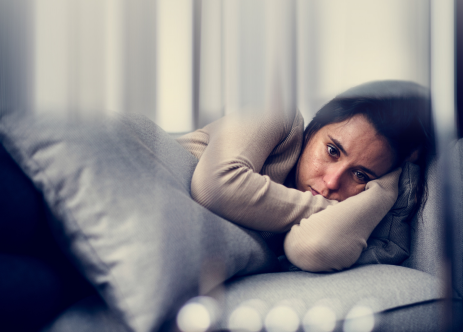
Safe Pharmacy was launched in July 2022; a new IPU-led initiative to enable people experiencing domestic abuse or coercive control to receive support in their local pharmacy by assisting them to access the services they need. Those experiencing domestic abuse and coercive control may have difficulty making contact safely with the support they need while they are at home. Their movements and access to phones may be monitored and limited. Safe Pharmacy enables victims to make a phone call in a confidential and private space either to a family member, the local domestic violence services or An Garda Siochana. Pharmacies that sign up to the initiative and nominate a Safe Pharmacy Champion to take responsibility for the operation of the initiative within that pharmacy. Pharmacies are ideally placed to offer this service due to their ease of accessibility, coupled with the important level of trust that the public hold for pharmacies and their staff within communities.
Each participating pharmacy receives a pack containing a Safe Pharmacy decal for display in the pharmacy window, lapel pins with the Safe Pharmacy logo for the Safe Pharmacy Champions to wear, a comprehensive list of the contact details for domestic violence services, and a Safe Pharmacy poster. The poster can be displayed in the consultation room, onto which each pharmacy can write the contact details for their local support agency and their local Garda station.
Any interventions that you make as part of Safe Pharmacy should be logged on the IPU Website at ipu.ie/report-incident. The report includes the pharmacy details, how the individual accessed the initiative, and what actions were taken by the pharmacy. We also ask, ‘How confident were you in responding to the Safe Pharmacy user?’, and ‘Is there anything else you need to support you in your role as a Safe Pharmacy Champion?’
Due to the nature of the service, pharmacy staff are encouraged to look after their own mental health and discuss any incidents which maybe upsetting with a work colleague. The IPU also offer access to a free and confidential counselling service for all staff members through the IPU Members Assistance Programme.
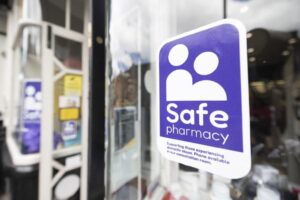
The IPU are introducing a new course for members on 1 July, titled Safe Pharmacy, Understanding Domestic Abuse and Coercive Control, Creating a Safe Environment for Disclosure. This course is certified by the global awarding body ATHE (Awards for Training and Higher Education), and the cost to complete this course is fully sponsored by the IPU.
An Garda Síochána continue to support the Safe Pharmacy initiative which commenced 12 months ago in the Limerick Garda Division. We value this successful collaboration which offers the victims of domestic abuse a safe place to reach and access support services”. Derek Smart, Chief Superintendent, Limerick Division, Henry St, Limerick
The course is broken down into seven modules which can be completed over a period of time that suits each participant. This course is easily accessible from a mobile phone, and the time required to complete each module will be clearly indicated before it starts. You can sign up for this training at iputrainingunit.com.
The IPU in conjunction with Safe Ireland ran two live webinars in 2022, which were recorded and can be viewed on the IPU website.
In December 2022, the IPU attended the Limerick Gardai Domestic Violence Seminar where Joyce Mulpeter, IPU Member Relationship Manger and I, gave a presentation on the Safe Pharmacy initiative to further promote the service. Among the agencies present at the event were TUSLA, the Rape Crisis Centre, the HSE Safeguarding and Protection Team, Focus Ireland, and the Courts Service. There was great interest in, and support for, Safe Pharmacy at the event, and the Gardaí reiterated the importance of access to a phone for victims of domestic abuse and coercive control.

We currently have 1063 pharmacies signed up to the Safe Pharmacy Initiative, representing 57% of pharmacies in Ireland but we are keen to increase that number.
You can sign up to the Safe Pharmacy Initiative on the IPU Website at ipu.ie > Safe Pharmacy > Get Involved. You will be asked for the pharmacy contact details, the name of your Safe Pharmacy Champion, and to confirm if you are happy for these details to be shared with An Garda Síochána. The Safe Pharmacy Champion is responsible for the operation of the initiative in the pharmacy, ensuring all members of staff are fully aware of the initiative. This must include all part-time and weekend staff, and any locums that may work in the pharmacy. There can be as many Safe Pharmacy Champions nominated, as the pharmacy may require. The pharmacy staff are not trained to advise, counsel, or offer solutions, but simply to offer a safe place and a safe phone.
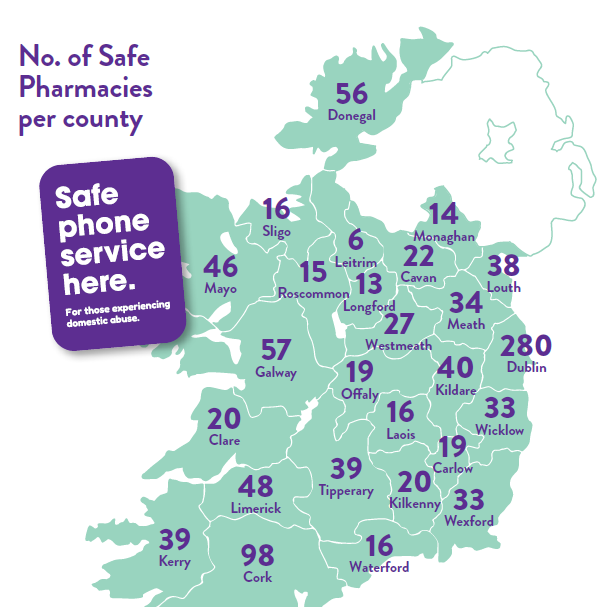
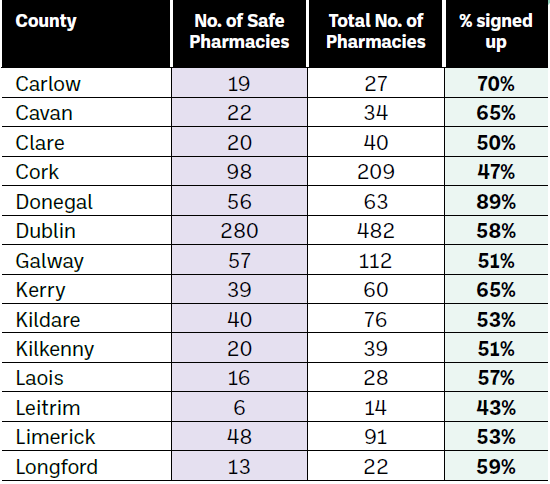
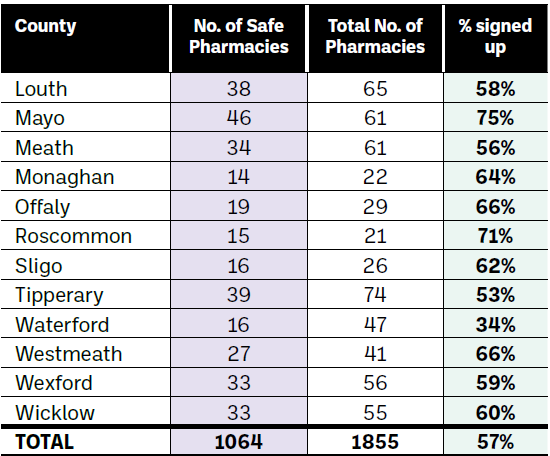
In the following pages we have included feedback from agencies we have worked with on the Safe Pharmacy initiative, in addition to first-hand accounts of pharmacy team members who are Safe Pharmacy Champions. For further details on Safe Pharmacy, or if you have any questions or queries, please contact Joyce Mulpeter by emailing joyce.mulpeter@ipu.ie or phoning 086 140 8964.

“An Garda Síochána continue to support the Safe Pharmacy initiative which commenced 12 months ago in the Limerick Garda Division. We value this successful collaboration which offers the victims of domestic abuse a safe place to reach and access support services”.
“The HSE support the Safe Pharmacy initiative and community pharmacies are extremely well-placed to help those experiencing domestic violence. The initiative provides an important service that is easily accessible, safe and confidential.”
“Safe Pharmacy is a powerful community-based initiative, which reminds every person walking through the door of their pharmacy that domestic violence is recognised and responded to locally, through the trained referrals of pharmacy staff, and the specialist domestic violence refuge and supports near to them. Safe Pharmacy says, ‘No More Shame, Silence or Stigma’.”
These are anonymous so we don’t have headshots etc. Can they be put into boxes or such like?
We recently spoke to three pharmacists who were willing to share their experience of using Safe Pharmacy in their store.
How did the person indicate that they needed help?
I have had two patients in our pharmacy in recent months who needed assistance dealing with significant issues at home.
The first lady, who was in her 60s, was collecting a prescription, and while I was speaking with her, I noticed that she seemed agitated and upset and I asked her would she come into the consultation room with me. After listening to her I told her that I was concerned for safety. I did not feel she was safe returning to her own home that day, and she agreed. I had the Safe Pharmacy poster hanging in my consultation room with the contact details of our local domestic violence services centre and I offered her use of the phone to call them. I made sure someone there was able to speak with her and then I left her to speak on the phone in confidence in the consultation room. I told the other staff members that the consultation room was in use so that she would not be disturbed. The Gardaí had previously been out to her home and had been reassured that everything was fine. This chance to use our phone in a safe space was invaluable to this customer. The instant access to local refuge services was invaluable and empowered the customer to get herself to a safe place for the night.
The second person we helped was a male, also in his 60s, who was asking some broad questions about health, and I invited him into the consultation room. From there we had a conversation about his home life, and it was clear he was a victim of financial abuse and coercive control. I offered him use of the phone that day, but he declined. I made him aware of Men’s Aid Ireland and how to contact them. I think he will contact them. In your opinion was the person aware of the Safe Pharmacy Initiative? No, neither were, but it was invaluable to have the Safe Pharmacy materials displayed in the consultation room, with the contact details of the domestic violence services on it.When in the consultation room, what support did the victims look for?
I offered the first lady use of the phone to call numerous services and she opted to call our local domestic violence centre. The second person did not avail of the phone, but did avail of the contact details. He said he felt heard and felt listened to, and it had made a difference.
Did you, as the support in pharmacy, feel safe helping the victim?
Yes, I felt safe, and I did not feel that it interrupted the workflow or services in the pharmacy at the time. Everything went very well, and I was left feeling that other services have failed these people in the past.
Did you feel comfortable and confident?
Yes, I felt comfortable and confident. Before Safe Pharmacy was initiated, I would have helped any of my customers in this situation. However, having the Safe Pharmacy initiative in place empowered me, it gave me confidence in my role as a pharmacist to know that this is part of our role, and we are not working beyond our boundaries, or our remit. We are not there to offer counselling, but to put the customers in touch with those people who can help them and offer a safe gateway to these services.
Would you like further training around domestic abuse and coercive control?
I would certainly avail of the further training when it is launched in July for my staff, so that they are aware of domestic violence and coercive control and aware that being a Safe Pharmacy can offer these people a safe space.
Many of these issues will be uncovered during our normal conversations with customers, around mental health issues that they may be experiencing, and so training in how best to speak with people with mental health difficulties could be beneficial.
What further support can IPU offer?
I think a reminder of the campaign both within the profession and to the public would be useful.
What would you say to other pharmacists who have yet to sign up to Safe Pharmacy?
I would strongly recommend that pharmacists sign up to this initiative. It is your own customers who come through your door each month who may need your help, and who would really benefit from the access to a safe phone or contact details for those that can help them. Signing up to the Safe Pharmacy Initiative will give you the confidence to help.
How did the person indicate that they needed help?
The lady in question came into the pharmacy to purchase an ice pack. She browsed around the pharmacy for a few minutes until the shop had emptied and then approached the counter to pay. During the transaction, our counter assistant, who happened to be our Safe Pharmacy Champion made some small talk with her as she usually would, and the lady started crying. She was invited into the consultation room and my counter assistance advised me that she was going into the consultation room with her, and she suspected that this may be a Safe Pharmacy situation.
The ice pack that she was purchasing was to relieve a blow that she had received to her face during her lunch break. She said her partner had assaulted her after an argument and that she had no choice but to return to work, but was concerned about what her colleagues would think of her face.
“Safe Pharmacy has given us knowledge of the resources available and what options to offer to somebody seeking help.”
In your opinion was she already aware of the Safe Pharmacy Initiative?
It transpired during the conversation that the victim was aware of the Safe Pharmacy initiative. We did not know her as a regular customer of the pharmacy, but she had been in once or twice before for occasional purchases. The fact that she had either seen the sticker on the door, or seen advertising of the initiative, suggested to us that this may not have been the first assault that she had sustained, given that she had taken note of the initiative.
When in the consultation room, what support did she look for?
She did not seek to pursue any action in this situation. She indicated that she would be happy to speak to the pharmacist because she was concerned that her cheekbone was fractured.
She now informed me that it was her partner’s housemate who had assaulted her, and it seemed she had changed her story out of fear. We asked would she like us to contact the Gardaí on her behalf, but she declined. She said that she would discuss it with a friend later and decide then how to proceed. I offered to contact either her own GP or a nearby walk-in clinic, but she refused this also.
She insisted that she needed to go back to work. I asked her more than once if she felt safe leaving the pharmacy, and going about her day, and she said that she did. We both stressed that she could return to us at any time if she wanted to take any further action or just to talk to us.
A week later, she returned to the pharmacy for us to re-examine her face. We asked her if we could do anything else for her, but she said no. However, she assured us that she would call back to us any time if she needed anything from us.
Did you, as the support in Pharmacy, feel safe helping this customer?
Yes. The customer in question was extremely gentle and grateful and in no way posed a threat. We do have panic buttons in the consultation room and throughout the shop and dispensary, in case of emergency.
We also felt safe in the training we have completed, that we were approaching the situation with compassion for the victim and would not do or say anything to jeopardise her.
We both felt well prepared and confident in helping this victim. The Safe Pharmacy training, even though it is a year since we completed it, gave an excellent foundation for how to approach a victim suffering domestic abuse. We frequently have people ask for a private conversation in the consultation room for a variety of reasons, so the basic principle of coming to the aid of somebody like that is a regular occurrence in a pharmacy. This simply builds on that situation and has given us knowledge of the resources available and what options to offer to somebody seeking help.
Would you like further training around domestic abuse and coercive control?
I would value assistance on helping somebody who is declining further support. We assured her she could come and talk to us again at any time, but we wondered if there would have been more appropriate language that we could have used to help her gain the confidence to file a report with the Gardaí on what had happened.
Otherwise, we feel that the Safe Pharmacy Initiative is a fantastic scheme and one that we are extremely proud to take part in.
A major positive for us is that the Safe Pharmacy Champion is not the pharmacist. Some people might feel that the pharmacist is extremely busy and that it would be rude to disturb them. It was easy for this customer to slip into conversation with our counter assistant, and for them to sit into the consultation room together. However, because we both completed the training, my counter-assistant was able to call on me for support when she felt it was needed. I would strongly advise any pharmacy joining this initiative to train a member of staff, other than the pharmacist, as their Safe Pharmacy Champion.
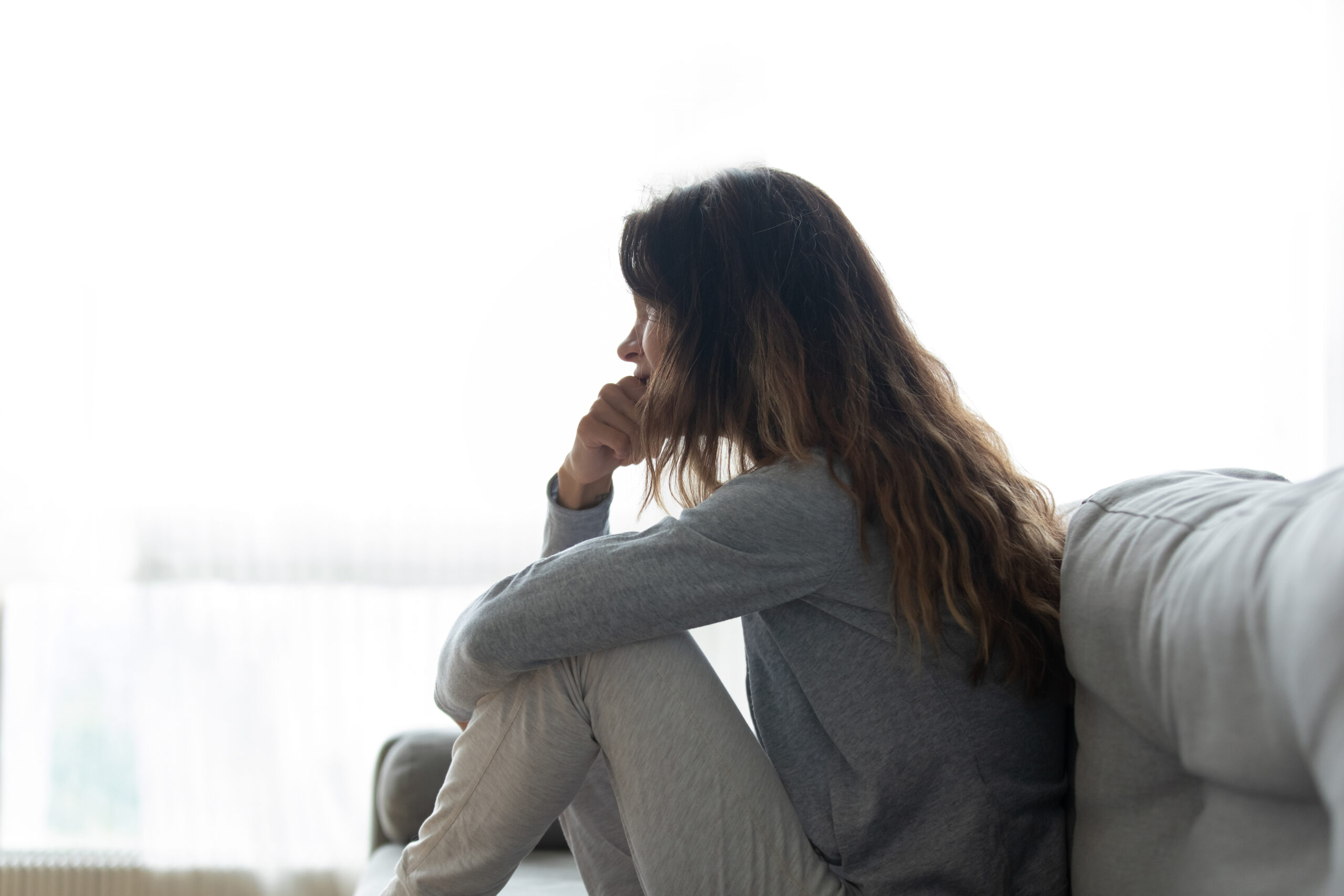
How did the person indicate that they needed help?
I have had a few people in our pharmacy seeking assistance.
One young girl came in recently who was concerned because her partner was being released from prison, and there was a history of domestic violence in their relationship. She came into the pharmacy seeking advice and she was distressed, so I invited her into the consultation room.
Another lady that came in who seemed very shaky when she was collecting her prescription, and so I invited her into the consultation room. She asked me how she would go about getting help. She was not in immediate danger, but described a coercive relationship where her finances were also being controlled. She did not have a phone with her so that was possibly being controlled too.
“The principle of Safe Pharmacy is just another part of our patient care. A few minutes of your time could change someone’s life forever. A small intervention can make an enormous difference.”
In your opinion were they aware of the Safe Pharmacy initiative?
I do think the young girl was aware of Safe Pharmacy as she came in specifically to speak to us. We have the Safe Pharmacy logos displayed in the pharmacy. The second lady probably was not specifically aware.
When in the consultation room, what support did the victims look for?
I offered both customers use of our phone, but they did not use it. I had the Safe Pharmacy poster on the wall in the consultation room, with the local domestic violence services’ phone numbers on it. Both customers took down the phone numbers and I do feel that they may use my phone in the future. I told both that they have a safe space to come to in my pharmacy and can come into us anytime.
Did you, as the support in pharmacy feel safe helping the victim?
Yes, absolutely. I felt safe.
Did you feel comfortable and confident?
Yes, I felt comfortable and confident. It was useful to have the local numbers on the poster on the wall in the consultation room. I was able to reassure them that what they were experiencing was not normal and it would be advisable for them to seek help.
Would you like further training around domestic abuse and coercive control?
Yes, once the training is available on the IPU website, I will certainly give my staff the opportunity to complete it.
What would you say to other pharmacists who have yet to sign up to Safe Pharmacy?
As pharmacists we are at the centre of the community, we are accessible and trusted, and people will talk to us. We have a duty of care to our customers. To me, the principle of Safe Pharmacy is just another part of our patient care. A few minutes of your time could change someone’s life forever. A small intervention can make an enormous difference.
Tara Kelly MPSI
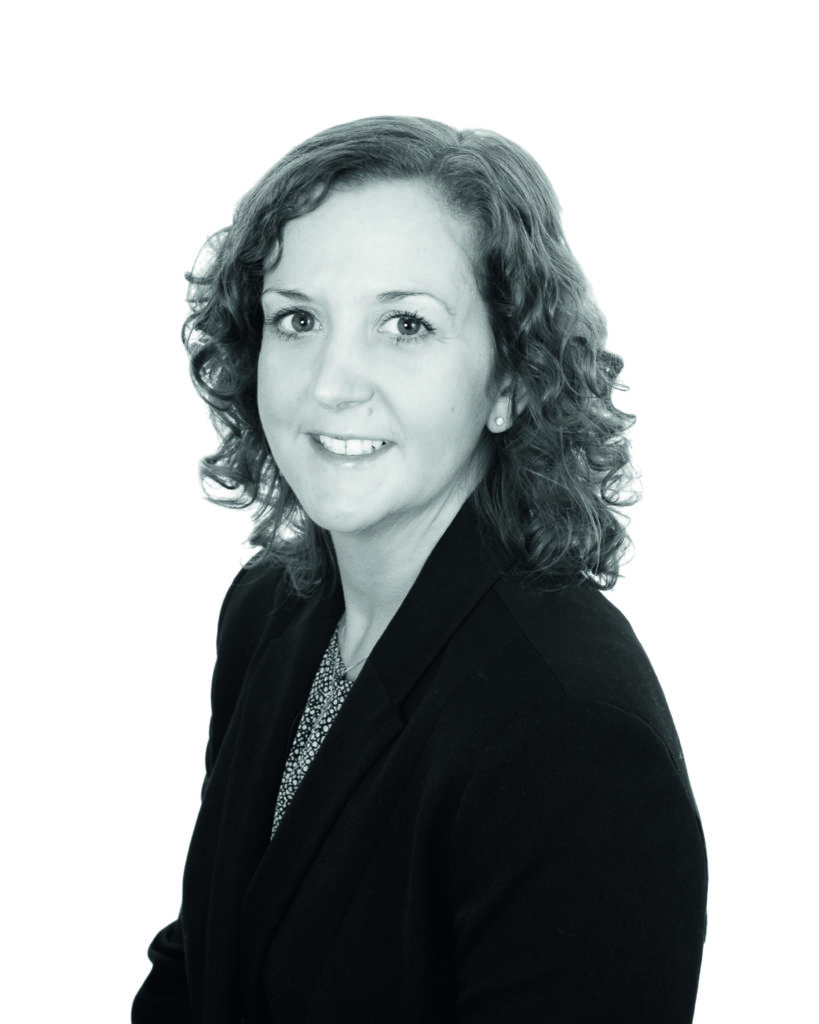
IPU Medicines Information Pharmacist
Highlighted Articles